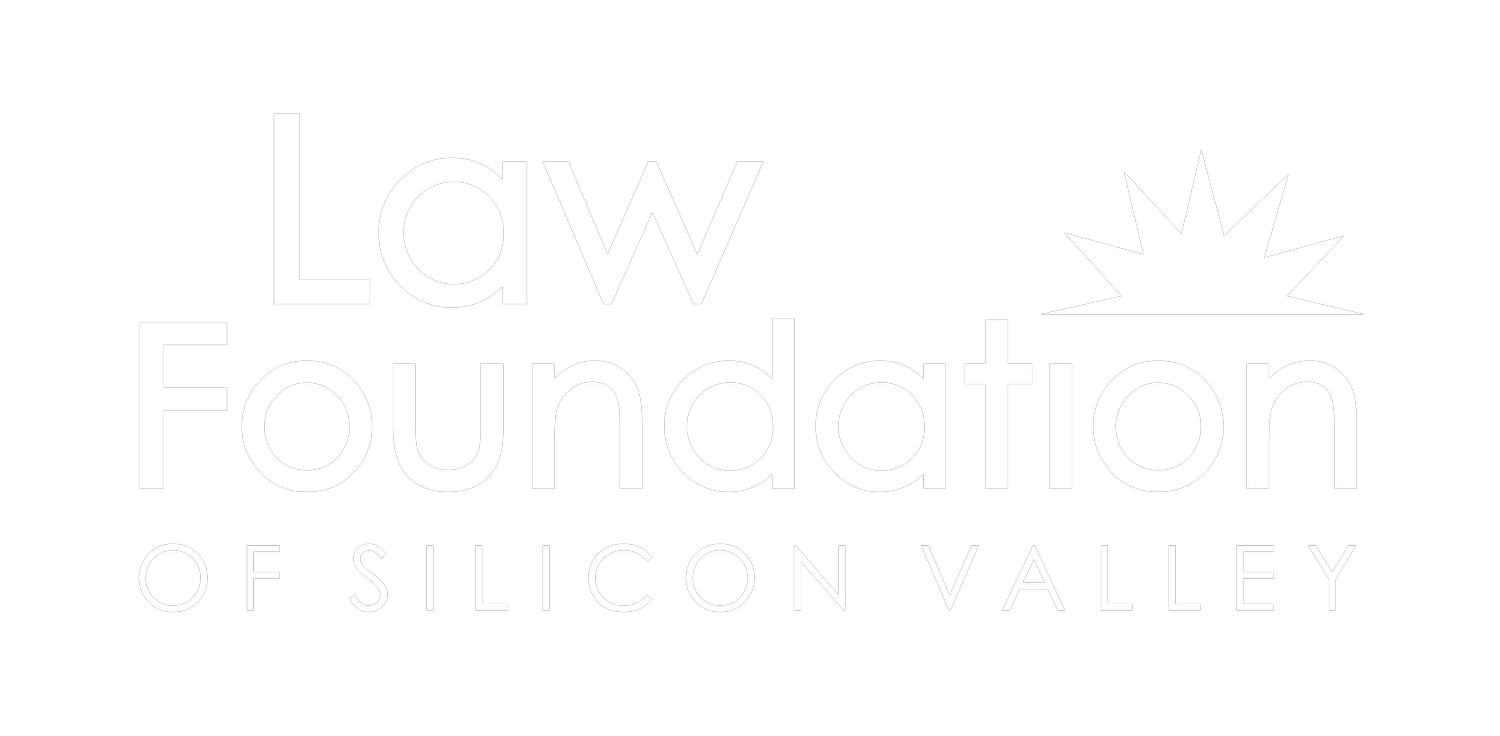Dear Friends,
I don't have to tell you how strange the past several weeks have been.
Each of us is experiencing a complex array of emotions, including concern for friends and family; uncertainty about what's to come; and confusion about what we can expect not just next week, but months from now.
For the many thousands of people in our community who live paycheck-to-paycheck or are homeless, the intensity of this crisis is amplified.
The familiar adage made famous by Fred Rogers, who told us to "look for the helpers," could not be truer than it is today. People like you, who donate, volunteer and otherwise support the Law Foundation, are the "helpers."
Our team of dedicated staff, who continue to work tirelessly on behalf of clients, while tending to their own family's needs, are the "helpers."
Our board members, who are concerning themselves with the health and stability of our organization in the midst of this crisis, are the "helpers."
We are being told by medical experts to brace ourselves for things to get worse before they will get better. The silver lining in that message is that things will get better.
For today, let's not lose our hope or our sense of belonging, and let's continue to find the ways, big and small, that we can help each other.
With gratitude,
Alison Brunner, Esq.
Chief Executive Officer
NEWS
Law Foundation Launches COVID-19 Fund
We've mobilized to help new and existing clients in the face of the coronavirus pandemic. Now we're asking for your help. Please contribute to our COVID-19 Fund and help us continue to prevent homelessness, keep foster kids connected with loved ones and assist veterans, low-income families and those who live with a disability with accessing much-needed benefits. Donate Now
Safe and Stable Housing is Critical During a Public Health Crisis
For many people, the order to shelter-in-place is resulting in loss of income from missed days of work or being laid-off altogether. A new month has begun, and many of our neighbors are unable to pay rent. In anticipation of this, our housing attorneys and staff have been publicly urging elected officials to enact eviction moratoriums locally and statewide. Becoming homeless is devastating at any time, and is especially dangerous during a pandemic. We successfully advocated for eviction moratoriums in San Jose, Palo Alto, and the City of Santa Clara. Last week, the Santa Clara County Board of Supervisors voted to freeze evictions within the county during the crisis.
Our team has been interviewed for several news stories in recent days. Click the links below to learn more.
Protecting Immigrant Children in Detention
As co-counsel on the Flores Settlement Agreement, which governs the length of time and conditions under which children may be detained, we recently supported the filing of a Temporary Restraining Order to protect youth amid the COVID-19 crisis.
Thousands of detained minors are at risk of becoming ill during this public health crisis. Federal facilities are not equipped for preventing or addressing the spread of COVID-19 and children should not be put in congregated settings such as detention centers and shelters, which could easily create a rapid spread of infections from person to person.
In response to our filing, U.S. District Court Judge Dolly M. Gee issued an order that the Trump Administration should "make every effort to promptly and safely release" migrant children from government custody. By April 6, federal officials must report to the court on their efforts to release children and reunify families. Read more.
Keeping Foster Kids Connected
There are 60,000 children in foster care in California on any given day. Visits with siblings, parents or other family members are crucial to their well-being. The order to shelter-in-place puts hundreds of children in Silicon Valley at risk of being unable to connect with family in person. We successfully advocated with the Department of Family and Children's Services, the Office of County Counsel and Dependency Advocacy Center so that many of these foster youth can see their family if it is safe, and visit by phone and video conference when it is not.
As our dependency team continues to support their clients adapting to the current crisis, we will focus on minimizing the impact of this disruption in family contact in the following ways:
By educating the caregiver community on the importance of biological family relationships and the role they can play in supporting the children in their homes.
By advocating with child welfare agencies to ensure each child's rights are respected and ensure that we are supporting the emotional well-being of the youth we serve.
By working with the affected children and teens currently in foster care to ensure that they are being granted the access to their biological families they are entitled to either in person, by phone or video conference.
ADVOCACY
Just and Humane Response
Attorneys and staff in our health program collaborate with criminal justice advocates in Santa Clara to call for specific actions related to maintaining the health, safety, and dignity of people in custody and in the criminal process during this public health crisis. Supporters can help by signing this petition advocating for systemic changes that would make it more fair for everyone in our community to find housing, jobs, and resources. You can also sign this petition to support a just and human response to the COVID-19 outbreak for those in our criminal justice system.
In Case You Missed It
Santa Clara County's Eviction Moratorium
The eviction moratorium approved by the Santa Clara County Board of Supervisors in March provides tenants with a number of protections to prevent evictions during the COVID-19 public health crisis.
Watch Michael Trujillo, Law Foundation attorney, explain the top five things tenants should know about the law.
Funding for Nonprofits
The COVID-19 crisis has impacted every nonprofit operationally and financially. During the March 24 Santa Clara County Board of Supervisors meeting, Law Foundation CEO Alison Brunner, along with other local nonprofit leaders, provided comments in support of the county contributing $1 million to the Silicon Valley Community Foundation's COVID-19 Respond Fund.
Protecting Mobile Home Parks As Affordable Homeownership
The Law Foundation commended San Jose City Council for unanimously passing a measure that would change the general plan designation for all 59 mobile home parks in the city. This makes it harder to convert or close parks, which are a critical source of affordable homeownership. The Law Foundation is proud to have been a part of this and will not stop standing alongside the 35,000 people living in parks to ensure that everyone in our community has access to a safe and stable home. Read more.
PRO BONO SPOTLIGHT
We are grateful for the outpouring of support we have received from our dedicated volunteers. We anticipate there will soon be opportunities for pro bono attorneys to help in a variety of ways, such as advocacy at the state and local level, researching available federal and local programs, and drafting FAQ's, templates and other forms. If you're interested in receiving opportunities, please email probono.info@lawfoundation.org.
COVID-19 RESOURCES
The Law Foundation established a web page with information and resources for our communities to access related to the coronavirus outbreak. We update this page regularly with links to websites, documents, and other organizations providing help: www.lawfoundation.org/coronavirus. If you have additional resources or information, please email communications@lawfoundation.org.
While our office is temporarily closed, our staff continue to work remotely. Call (408) 293-4790 to contact us.














